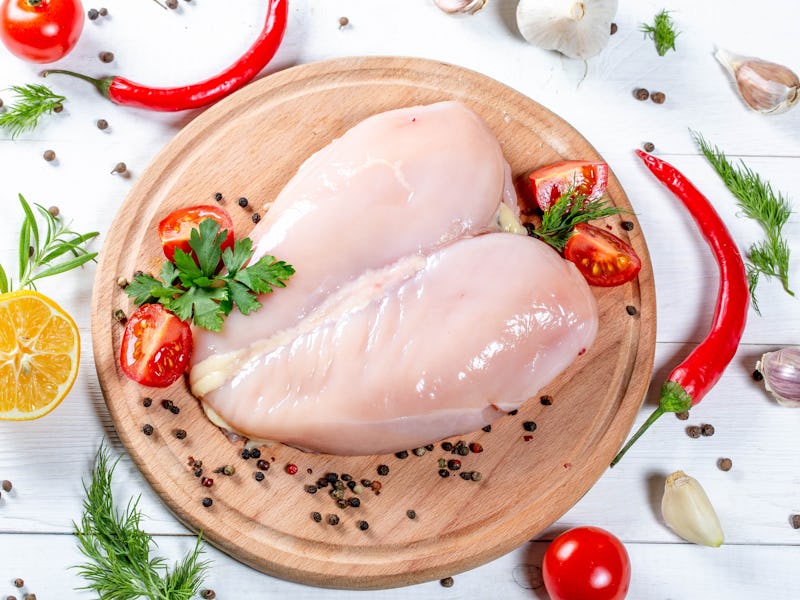USDA Begs Americans to Finally Stop Washing Their Chicken
It's not worth it.

Raw chicken, with its slightly slimy sheen, doesn’t look clean enough to eat. That doesn’t mean that you should wash it with water, though. While it’s common practice for some — and even the legendary chef Julia Child washed her poultry — scientists consistently agree that rinsing chicken is dangerous.
A report from the US Department of Agriculture released on Tuesday is the latest in a long line of research to link poultry washing to an increased risk of becoming ill. That’s because raw chicken is often contaminated with Campylobacter bacteria, as well as Salmonella and Clostridium perfringens bacteria. Cooking chicken at 165 degrees Fahrenheit is all you need to destroy these bacteria and make the meal safe to consume.
Meanwhile, washing chicken easily spreads the bacteria to other surfaces and foods, increasing the likelihood of an unsuspecting encounter that causes people to become sick.
This investigation was a partnership between the USDA and North Carolina State University. Overall, 300 people were asked to prepare a chicken and a salad in a test kitchen located in either the Raleigh-Durham area of North Carolina or in Lillington, North Carolina. All participants self-reported that they had some experience washing or rinsing raw chicken at home. Their reasons for washing included the intention to “remove blood/slime” or “because that is how a family member does it.”
These participants were broken up into two groups — one that was told before the cooking experience that washing their poultry was dangerous, and one that was not. When they started cooking, 93 percent of the first group did not end up washing their chicken, while 61 percent of the second group did.
Overall, preparing raw chicken close to a salad created a potentially dangerous scenario. Twenty-six participants who washed their chicken accidentally transferred the chicken’s bacteria to their salad lettuce. But even when people didn’t wash their chicken, 31 percent still ended up with salad that was contaminated with chicken bacteria. This cross-contamination is chalked up to “a lack of effective handwashing and contamination of the sink utensils.”
“Please keep in mind that children, older adults, and those with compromised immune systems are especially at risk,” explains Administrator Carmen Rottenberg of USDA’s Food Safety and Inspection Service. “Washing or rinsing raw meat and poultry can increase your risk as bacteria spreads around your kitchen, but not washing your hands for 20 seconds immediately after handling those raw foods is just as dangerous.”
The investigators also found that 60 percent of the sinks and counters in the test kitchens used by the chicken-washers were contaminated with bacteria as well. Furthermore, 14 percent of these surfaces remained contaminated even after they were cleaned.
Luckily, no one ate any of the food prepared in the test kitchen.
The report additionally notes that, while it’s popular to brine poultry in salt water, vinegar, or lemon juice, that practice only flavors the chicken. It does not destroy bacteria, and that bacteria, in turn, contributes to millions of cases of foodborne illnesses that strike Americans each year.
If you really want to get the slime off your chicken, the best thing to do is to pat the area down with a paper towel and wash your hands as soon as possible.